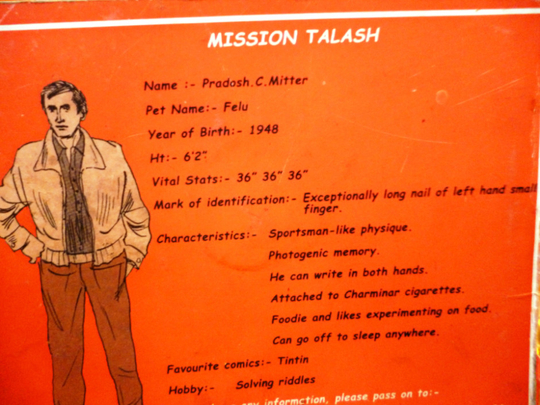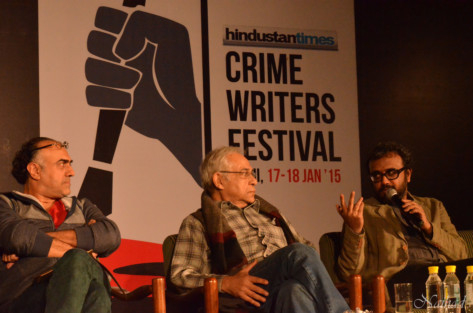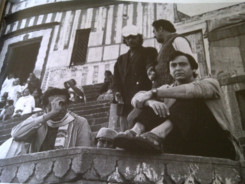
This January Kolkata saw serpentine queues in front of cinema halls where films on two of Bengal’s favourite sleuths was playing. I had gone with my mother, aunt and niece to watch one of them — starring the indomitable detective created by Satyajit Ray — Feluda.
Afterwards we went to a nearby cafe and discussed the new actor who had been cast as Feluda. No one was satisfied with the newbie. The café owner, a woman who had come to Kolkata after a sojourn in South Africa, joined in. My aunt is 78, my mother 75, I am in my forties, and my niece is 12. We were all avid fans of Feluda.
The crowds outside the hall reflected this diverse fan base — white haired octogenarians, 5 year olds, young college-goers, married couples, children in school. This was their New Year treat — watching one of the most enduring detectives in India do his thing.
Goyenda (detective) and goyendagiri (the art of sleuthing or deduction) have an unparalleled fan base in Bengal. Bengali writers have churned out perhaps the largest number of detective stories in India. They come in the form of books, or serialised in magazines and in the yearly special issues that are brought out during Durga Puja.
A census by a literary magazine indicated that there are 91 detectives in Bengali crime fiction. Bengali sleuths have fanzines and clubs dedicated to them. Kolkata even has cafés with sleuth themes, such as Baithak, obviously a popular hangout of every Bengali who has ever flipped through the well-worn Feludas and Byomkeshes on the family bookshelves.
The menu has a page devoted to Feluda’s characteristics with details such as name, age, height, dress code, and even vital stats.
It is clear that Kolkata is a city that is very much in love with detectives. Now the love for the Bengali goyenda has crossed borders. Byomkesh will make his debut in Bollywood soon. In fact, the rights to 32 Byomkesh stories have been bought by one of the largest film production banners in India — Yash Raj Films — for an amount rumoured to be around Rs100 million (Dh5.89 million). There are stories floating around in Bollywood that popular actor Aamir Khan may act as Feluda in a future project. A documentary (on a real-life Kolkata detective) called “The Bengali Detective” will be made into a Hollywood film by Mira Nair. Harper Collins will be coming out with an anthology of Bengali crime fiction translated into English by the end of the year.
All of a sudden, Bengal’s goyendas are the flavour of the season.
Of the 90-odd detectives in Bengali fiction, Feluda and Byomkesh lead the pack and their fame reaches beyond the borders of India. Feluda made it to an article on sleuth-centric travel by UK-based newspaper The Independent, along with Holmes’ London, Maigret’s Paris and Morse’s Oxford.
Early writers of detective fiction were influenced heavily by European counterparts, especially British ones such as Arthur Conan Doyle’s Holmes and GK Chesterton’s Father Brown.
In fact, the stories of many writers were set in London, or in an Anglophile’s Kolkata peopled with gas lamps and hansom cabs. A major influence on the goyenda genre was Arthur Conan Doyle and his creation Sherlock Holmes. Many writers, including Satyajit Ray, were fans. In the book “London-e Feluda”, Ray acknowledged this when he has Feluda visit Baker Street and say,“Guru, tumi accho boley ami acchi (Guru, I’m there because of you)”.
The detectives created by Bengali writers over the years are an interesting lot — writer Sunil Gangopadhyay’s 60-plus protagonist Kakababu is an ex-director of the Archaeological Survey of India. Kakababu appeared on screen last year with the release of “Mishor Rohoshyo”, set in Egypt. Then there are the child sleuths such as Gogol and Premendra Mitra’s Ghanada who gets tied up in cases involving secret service outfits such as the MI5, the CIA, the KGB and the Chinese.
The love for crime fiction can be traced back to 1892 when former policeman Priyanath Mukhopadhyay wrote “Banomali Daser Hatya” (The Murder Of Banomali Das). This was part of his “Darogar Daptar” (Police Inspector’s Office) series. It is supposed to have been published around the same time as the first lot of Sherlock Holmes mysteries. “Darogar Daptar” were largely procedurals and did not have the zing of memorable characters.
Some writers (such as Panchkori De) helped popularise the genre by simply re-positioning popular European detectives such as Holmes in Bengal and with Bengali personas. Some were heavily influenced by the ruling British culture, such as Dinendra Kumar Ray, who created characters that were London-bred and even had names such as Robert Blake.
One of the most popular yesteryear detective characters was the silk kimino-wearing Kiriti Roy whose stories were set in the early 1940s. His clientele were from the creme de la creme of society — royal figures, zamindars and rich businessmen. He was the creation of Nihar Ranjan Gupta, a doctor who is rumoured to have met Agatha Christie in London.
Others broke the anglicised detective trend with their sleuths set firmly in Bengal, such as Jayanta and Manik created by Hemendra Kumar Roy, who took pride in their Bangaliyana, and the dhoti and kurta they wore.
Roy was also a prolific children’s writer. Jayanta and Manik became popular with the youth belonging to the many secret societies which were begun in Bengal during India’s freedom struggle.
One of the most enduring of Bengal’s detectives is Byomkesh Bakshi. Proof that people in Kolkata take him rather seriously is the fact that his mysteries are part of the state’s school syllabus. Byomkesh was a post-colonial reaction to the endless copies of Western-influenced detectives — an educated middle class guy or “bhadralok” protagonist in a Bengali milieu.
Satyajit Ray’s endearing sleuth Feluda debuted in “Feludar Goendagiri” in December 1965. What set the stories apart was Ray’s detailed descriptions of characters and places. For me, as someone who left Kolkata at 8, reading Feluda mysteries provided a glimpse into the beloved hangouts I had left behind. Among my prized possessions is a series of Feluda comics rendered in beautiful watercolours.
You can see the details in the old mansions of Kolkata and places such as New Market. At Ananda bookstore, these are among the hottest selling items. Ananda also stocks T-shirts with Feluda and his sidekicks printed on them.
What is it about Bong sleuths that has taken everyone’s fancy? According to writer Subhadra Sengupta who has written the text for a series of Feluda comics in English, the books work because of their plots, interesting characters and locations. She thinks however that, like Sherlock, Feluda needs to be modernised for today’s kids to take the stories.
Among the most awaited films from the Bollywood stable is filmmaker Dibakar Banerjee’s Byomkesh mystery. It is expected to be a lavish period film that recreates 1943 Calcutta, including the Japanese bombing of its port. Bollywood star Sushant Singh Rajput plays a fresh-out-of-college Byomkesh. It is expected to be released in April. Its IMDb.com page says: “The first adventure of Byomkesh, fresh out of college, as he pits himself against an evil genius who is out to destroy the world.”
Banerjee has ruffled a few Bengali feathers with his characterisation of Byomkesh as a muscled, obviously north Indian faced man. He has also moved Byomkesh’s debut by 12 years — from 1931 to 1943. People are also waiting with bated breath for confirmation of rumours that Feluda will debut in Bollywood with Aamir Khan playing the role in director Shoojit Sircar’s remake of Ray’s classic “Sonar Kella”.
This will be followed by crime comedy-drama Bengali Detective directed by Mira Nair for Fox Searchlight.
Monsoon Wedding’s Sabrina Dhawan is writing the script. The film is based on a documentary directed by Phil Cox which screened at Sundance in 2011. It is based around a real-life private eye who nurtures a secret dream to dance on a reality show on TV. Searchlight are the people behind 2008’s “Slumdog Millionaire” and “The Best Exotic Marigold Hotel”.
In an interview, Philip Cox has talked about the widespread interest in sleuthing in Kolkata and the enduring love for detectives.
It remains to be seen, however, whether the Bengali word goyendagiri will become common Indian lingo.
Anuradha Sengupta is a writer based in Mumbai














